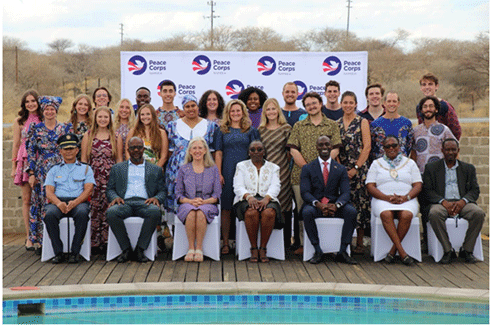Julina Kaakunga
After 12 weeks of pre-service training in Okahandja, the 52nd cohort of 22 Peace Corps volunteers who arrived on 30 August, were sworn in on 16 November.
These 22 volunteers will serve in the education sector in schools across the nation for two years.
“The U.S.-Namibia partnership is strong and diverse, built upon a foundation of meaningful people-to-people relationships forged in shared values including democracy, rule of law, and human rights,” Deputy Chief of Mission, Brandon Hudspeth was quoted in a media statement.
Peace Corps is a significant part of the overall U.S. presence in Namibia and is an important cornerstone of our friendship,” said Hudspeth. In 1990, the Namibian government invited Peace Corps volunteers, who then, began serving that same year. Since then, more than 1 800 American volunteers have worked in various sectors, which includes, education, health and economic development. They live in communities, learning local languages and integrating into the culture to foster world peace and friendship. Peace Corps volunteers collaborate with locals on locally driven initiatives that foster understanding, foster relationships, and have a long-lasting and quantifiable impact.
In collaboration with the Ministry of Education, Arts, and Culture, the new cohort will be positioned at 22 schools throughout Namibia. There are currently 14 Peace Corps volunteers working in six different regions of the nation in the fields of health and economic development.
After the global evacuation of the 126 Peace Corps volunteers in March 2020 due to the pandemic, this is the first group of education volunteers to return to Namibia. The goal of pre-service training is to give trainees practical experience in the application of methods that contribute to the development of successful partnerships between the trainee and the community. One such experience involves working with people of the host community, Okahandja. In addition to learning about Namibia’s economic, health, and education sectors and particularly current HIV/AIDS interventions, the trainees took part in intensive technical training on classroom management in schools and intercultural sessions to deepen their understanding of the local cultures, which is essential for successful community integration. One of the following regional languages is also taught to each trainee: Oshikwanyama, Rukwangali, Khoekhoegowab, Otjiherero, and Oshindonga.
Over the course of their two years in Namibia, this varied group of Americans will do their service in both rural and urban places across seven different regions. Their main responsibility will be to assist schools by mentoring pupils for academic performance and teaching English, science, technology, engineering, and mathematics subjects.


